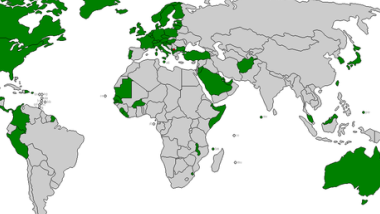On the contrary, the sentence of the International Court of Justice (ICJ), presented on Thursday, July 22nd at The Hague, is surprisingly clear and without appeal. Kosovo’s independence, declared unilaterally in February 2008, does not violate any rule of the international law. Therefore, it is judged legal without condition. This is a definite victory for Pristine, however it is not really going to reverse the trend. Kosovo continues to be politically and economically subdued to the international community.
The ICJ, in charge of solving the disputes between states, was summoned by Serbia in October 2008 in order to decide if the declaration of independence was “conform to the international law”. The opinion given by the ICJ is not binding for UN member states, therefore Serbia and the opponents of Kosovo’s independence are not obliged to revise their political position in the next days. On the other hand though, more than thirty countries were waiting for this judgement to have their say. Today 69 countries recognize Kosovo, among them the US and 22 of the 27 member states of the EU. A number which is going to rise in the next weeks.
If Kosovo’s independence seems more credible after the ICJ’s judgement, it is not going to convince the tireless opponents of Pristine. Serbia has immediately declared that it will “never” recognize the independence of its former province and, by doing this, it is followed by powerful allies such as Russia, China or Spain, themselves trying to solve the problem of regional independence movements and of minorities. According to these states, the unilateral declaration of Kosovo would be a precedent for numerous European regions (e.g. Catalonia, Transnistria, Russian republics) and for some Balkan minorities (Serbian in Bosnia-Herzegovina, Albanian in Macedonia, Hungarian in Slovakia). Actually, these last ones could use Kosovo for their independence requests, casting doubt upon the international frontiers agreement and permanently destabilising the region. Kosovo would then be the starting point of a «domino game» of declarations of independence, which would cross Europe from the Atlantic Ocean to the Caucasus.
If Kosovo’s independence seems more credible after the ICJ’s judgement, it is not going to convince the tireless opponents of Pristine
Kosovo: the isolated domino
These fears are justifiable but this kind of scenario is not credible. In fact there could have been a possible chain reaction of declarations of independence in 2008, after Pristine declared independence itself. But there wasn’t. The independence movements didn’t use Kosovo to undertake their battle and the decision of the ICJ didn’t attain that objective either. In any case, the international community would not tolerate a continuous disintegration of states in the world, and this without prejudging its coherence.
Thus it is improbable that Kosovo will become a model for these regions, also because before the declaration of independence it was under United Nations mandate (1999-2008), which conferred it a particular and unique status. Actually Kosovo was already autonomous and independent from Serbia as a will of the international community. In any case the judgement of the ICJ underlines that the declaration of independence was in contradiction neither with the United Nations mandate nor with the constitutional basis of that country. Therefore Kosovo’s situation is very specific and it has the exceptional support of the United States and of the European Union, which, in any case, would not accord other «bonuses» for the provinces in the Balkan region to secede: the stability of the frontiers remains a priority for Brussels, given the difficulties in attaining it.
Declaration of dependence
The ICJ’s sentence is not going to change the trend for Kosovo. Actually, it could only confer it more credibility in the negotiations for joining the United Nations. On the other hand a negative outcome would not have changed the present scheme either. The European and international perspective would have stayed the same and the international donors, with their development programmes, would not have left the country for that. Concerning the US, they have already announced that they would not consider a negative judgement from the ICJ.
The judges of The Hague have given a juridical opinion, not a political one, because they pronounced themselves on the legality rather than on Kosovo’s ability in creating an independent state. However, it is exactly on this point that the political debate begins. Kosovo’s priorities stay the same after the ICJ’s sentence: establishing the rule of law and recovering from a disastrous economic situation. Kosovo’s development perspectives are nearly non-existent: embedded, worked on, consumed by corruption, the country does not export anything and imports everything, including what it could produce by itself. Although the biggest resource of the country are the young people (50% of the population is under 25), the unemployment of youngsters peaks at more than 70%. Thus, economically the country lives on international aid.
Politically, it owes everything to the US and Europe and remains totally subordinated to their agenda.
Even if Kosovo is now legally independent, it has signed with the international community a declaration of political and economic dependence for the next decades. From now on the question is whether Kosovo will be able to maintain its independence.






Follow the comments: |
|
